The Role of Human Rights in Shaping International Relations: An Essay
VerifiedAdded on 2022/10/17
|12
|3214
|15
Essay
AI Summary
This essay examines the critical relationship between human rights and international relations, focusing on the impact of the Universal Declaration of Human Rights (UDHR) in the aftermath of World War II. The essay highlights the historical context, emphasizing the horrors of WWII and the subsequent need for a global framework to protect human rights. It explores the UDHR's role in promoting peace and justice by addressing the causes of conflict and establishing universal rights. The essay discusses the influence of realism and liberalism on international relations and how the UDHR provides a universal set of rights to states. It delves into specific articles of the UDHR, such as Articles 1, 2, 4, 15, 28, and 30, explaining how they contribute to international relations and prevent future conflicts. The essay concludes by underscoring the UDHR's importance in establishing international standards, ensuring equal rights, and fostering cooperation among nations to prevent situations like WWII.
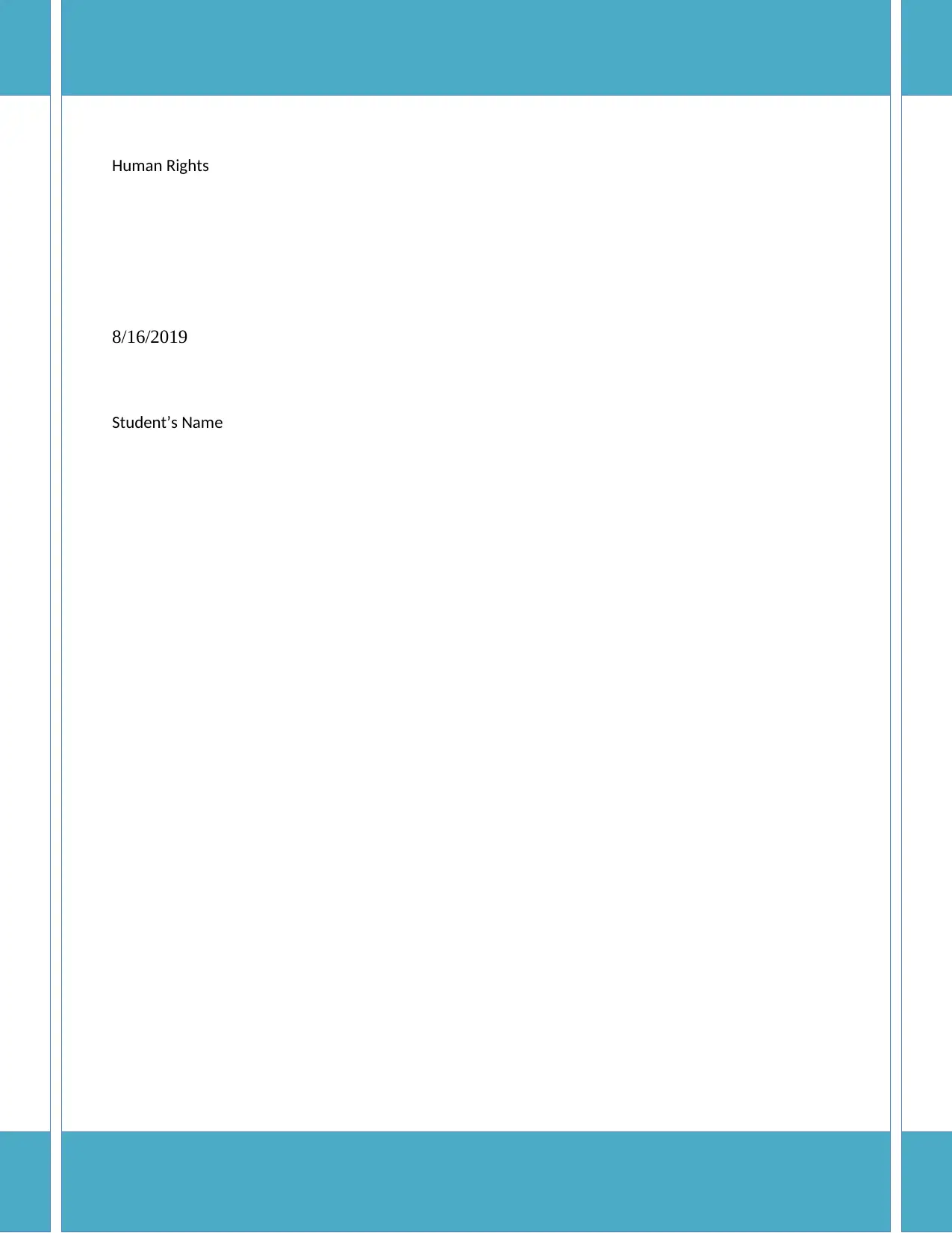
Running Head: HUMAN RIGHTS 0
Human Rights
8/16/2019
Student’s Name
Human Rights
8/16/2019
Student’s Name
Paraphrase This Document
Need a fresh take? Get an instant paraphrase of this document with our AI Paraphraser
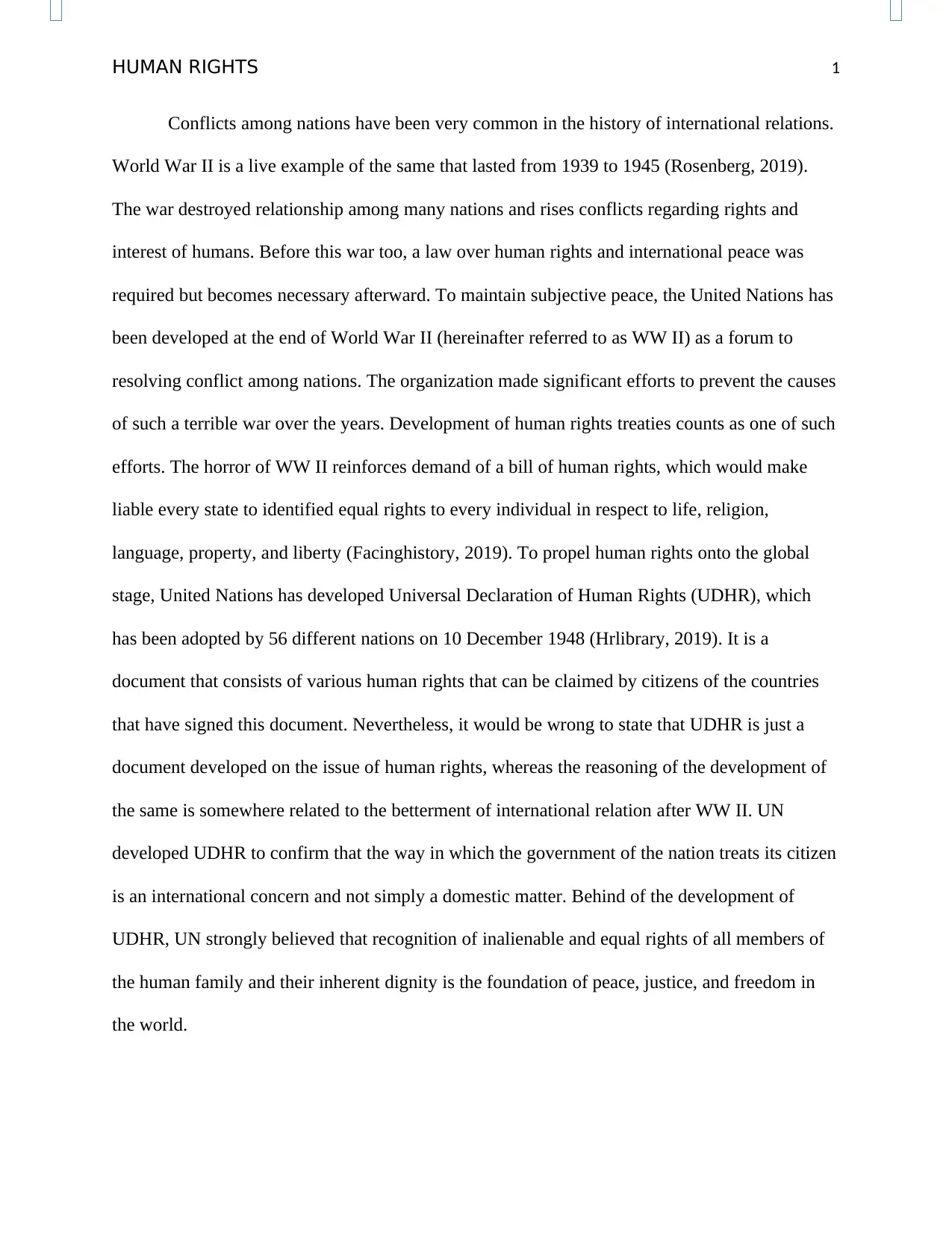
HUMAN RIGHTS 1
Conflicts among nations have been very common in the history of international relations.
World War II is a live example of the same that lasted from 1939 to 1945 (Rosenberg, 2019).
The war destroyed relationship among many nations and rises conflicts regarding rights and
interest of humans. Before this war too, a law over human rights and international peace was
required but becomes necessary afterward. To maintain subjective peace, the United Nations has
been developed at the end of World War II (hereinafter referred to as WW II) as a forum to
resolving conflict among nations. The organization made significant efforts to prevent the causes
of such a terrible war over the years. Development of human rights treaties counts as one of such
efforts. The horror of WW II reinforces demand of a bill of human rights, which would make
liable every state to identified equal rights to every individual in respect to life, religion,
language, property, and liberty (Facinghistory, 2019). To propel human rights onto the global
stage, United Nations has developed Universal Declaration of Human Rights (UDHR), which
has been adopted by 56 different nations on 10 December 1948 (Hrlibrary, 2019). It is a
document that consists of various human rights that can be claimed by citizens of the countries
that have signed this document. Nevertheless, it would be wrong to state that UDHR is just a
document developed on the issue of human rights, whereas the reasoning of the development of
the same is somewhere related to the betterment of international relation after WW II. UN
developed UDHR to confirm that the way in which the government of the nation treats its citizen
is an international concern and not simply a domestic matter. Behind of the development of
UDHR, UN strongly believed that recognition of inalienable and equal rights of all members of
the human family and their inherent dignity is the foundation of peace, justice, and freedom in
the world.
Conflicts among nations have been very common in the history of international relations.
World War II is a live example of the same that lasted from 1939 to 1945 (Rosenberg, 2019).
The war destroyed relationship among many nations and rises conflicts regarding rights and
interest of humans. Before this war too, a law over human rights and international peace was
required but becomes necessary afterward. To maintain subjective peace, the United Nations has
been developed at the end of World War II (hereinafter referred to as WW II) as a forum to
resolving conflict among nations. The organization made significant efforts to prevent the causes
of such a terrible war over the years. Development of human rights treaties counts as one of such
efforts. The horror of WW II reinforces demand of a bill of human rights, which would make
liable every state to identified equal rights to every individual in respect to life, religion,
language, property, and liberty (Facinghistory, 2019). To propel human rights onto the global
stage, United Nations has developed Universal Declaration of Human Rights (UDHR), which
has been adopted by 56 different nations on 10 December 1948 (Hrlibrary, 2019). It is a
document that consists of various human rights that can be claimed by citizens of the countries
that have signed this document. Nevertheless, it would be wrong to state that UDHR is just a
document developed on the issue of human rights, whereas the reasoning of the development of
the same is somewhere related to the betterment of international relation after WW II. UN
developed UDHR to confirm that the way in which the government of the nation treats its citizen
is an international concern and not simply a domestic matter. Behind of the development of
UDHR, UN strongly believed that recognition of inalienable and equal rights of all members of
the human family and their inherent dignity is the foundation of peace, justice, and freedom in
the world.
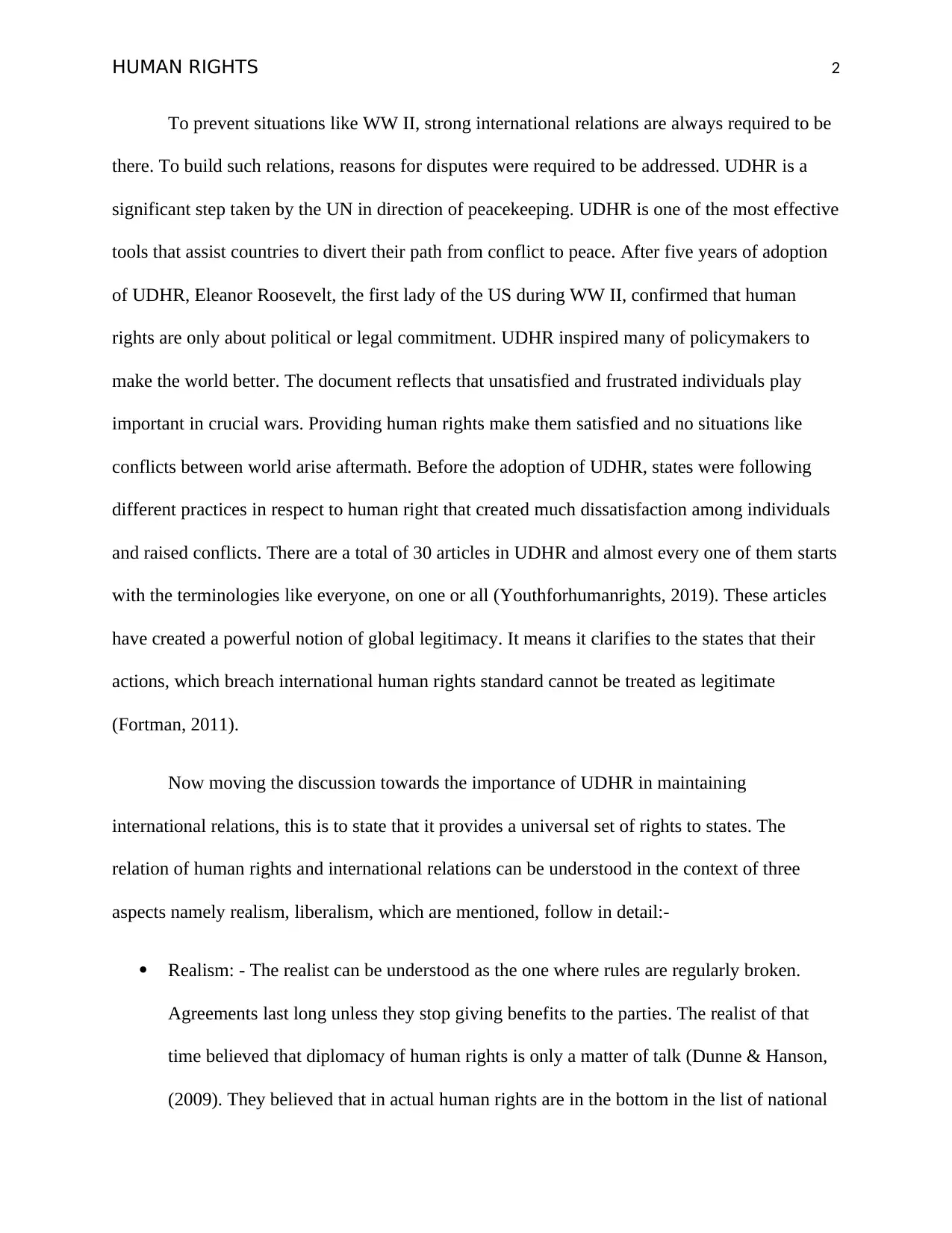
HUMAN RIGHTS 2
To prevent situations like WW II, strong international relations are always required to be
there. To build such relations, reasons for disputes were required to be addressed. UDHR is a
significant step taken by the UN in direction of peacekeeping. UDHR is one of the most effective
tools that assist countries to divert their path from conflict to peace. After five years of adoption
of UDHR, Eleanor Roosevelt, the first lady of the US during WW II, confirmed that human
rights are only about political or legal commitment. UDHR inspired many of policymakers to
make the world better. The document reflects that unsatisfied and frustrated individuals play
important in crucial wars. Providing human rights make them satisfied and no situations like
conflicts between world arise aftermath. Before the adoption of UDHR, states were following
different practices in respect to human right that created much dissatisfaction among individuals
and raised conflicts. There are a total of 30 articles in UDHR and almost every one of them starts
with the terminologies like everyone, on one or all (Youthforhumanrights, 2019). These articles
have created a powerful notion of global legitimacy. It means it clarifies to the states that their
actions, which breach international human rights standard cannot be treated as legitimate
(Fortman, 2011).
Now moving the discussion towards the importance of UDHR in maintaining
international relations, this is to state that it provides a universal set of rights to states. The
relation of human rights and international relations can be understood in the context of three
aspects namely realism, liberalism, which are mentioned, follow in detail:-
Realism: - The realist can be understood as the one where rules are regularly broken.
Agreements last long unless they stop giving benefits to the parties. The realist of that
time believed that diplomacy of human rights is only a matter of talk (Dunne & Hanson,
(2009). They believed that in actual human rights are in the bottom in the list of national
To prevent situations like WW II, strong international relations are always required to be
there. To build such relations, reasons for disputes were required to be addressed. UDHR is a
significant step taken by the UN in direction of peacekeeping. UDHR is one of the most effective
tools that assist countries to divert their path from conflict to peace. After five years of adoption
of UDHR, Eleanor Roosevelt, the first lady of the US during WW II, confirmed that human
rights are only about political or legal commitment. UDHR inspired many of policymakers to
make the world better. The document reflects that unsatisfied and frustrated individuals play
important in crucial wars. Providing human rights make them satisfied and no situations like
conflicts between world arise aftermath. Before the adoption of UDHR, states were following
different practices in respect to human right that created much dissatisfaction among individuals
and raised conflicts. There are a total of 30 articles in UDHR and almost every one of them starts
with the terminologies like everyone, on one or all (Youthforhumanrights, 2019). These articles
have created a powerful notion of global legitimacy. It means it clarifies to the states that their
actions, which breach international human rights standard cannot be treated as legitimate
(Fortman, 2011).
Now moving the discussion towards the importance of UDHR in maintaining
international relations, this is to state that it provides a universal set of rights to states. The
relation of human rights and international relations can be understood in the context of three
aspects namely realism, liberalism, which are mentioned, follow in detail:-
Realism: - The realist can be understood as the one where rules are regularly broken.
Agreements last long unless they stop giving benefits to the parties. The realist of that
time believed that diplomacy of human rights is only a matter of talk (Dunne & Hanson,
(2009). They believed that in actual human rights are in the bottom in the list of national
⊘ This is a preview!⊘
Do you want full access?
Subscribe today to unlock all pages.

Trusted by 1+ million students worldwide
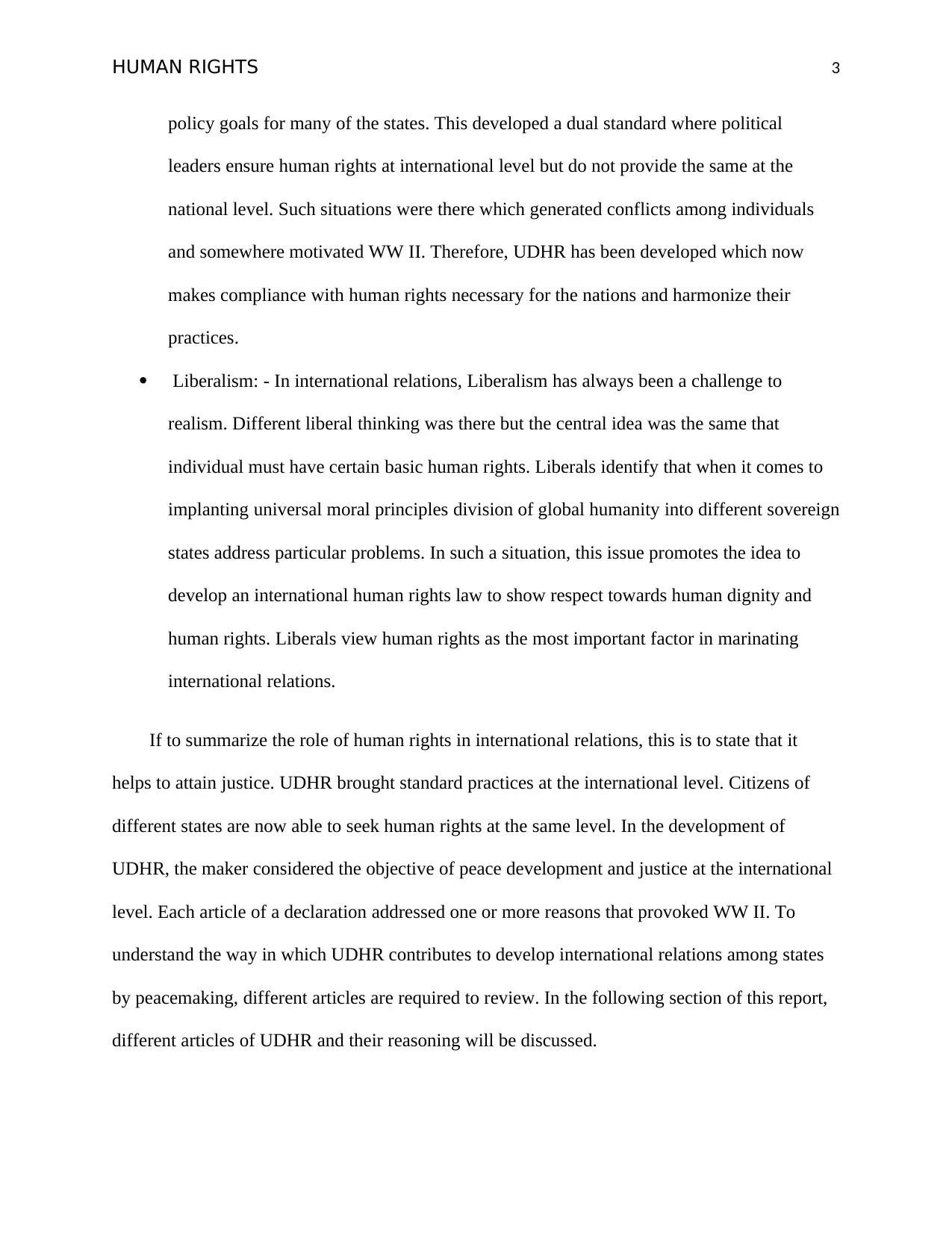
HUMAN RIGHTS 3
policy goals for many of the states. This developed a dual standard where political
leaders ensure human rights at international level but do not provide the same at the
national level. Such situations were there which generated conflicts among individuals
and somewhere motivated WW II. Therefore, UDHR has been developed which now
makes compliance with human rights necessary for the nations and harmonize their
practices.
Liberalism: - In international relations, Liberalism has always been a challenge to
realism. Different liberal thinking was there but the central idea was the same that
individual must have certain basic human rights. Liberals identify that when it comes to
implanting universal moral principles division of global humanity into different sovereign
states address particular problems. In such a situation, this issue promotes the idea to
develop an international human rights law to show respect towards human dignity and
human rights. Liberals view human rights as the most important factor in marinating
international relations.
If to summarize the role of human rights in international relations, this is to state that it
helps to attain justice. UDHR brought standard practices at the international level. Citizens of
different states are now able to seek human rights at the same level. In the development of
UDHR, the maker considered the objective of peace development and justice at the international
level. Each article of a declaration addressed one or more reasons that provoked WW II. To
understand the way in which UDHR contributes to develop international relations among states
by peacemaking, different articles are required to review. In the following section of this report,
different articles of UDHR and their reasoning will be discussed.
policy goals for many of the states. This developed a dual standard where political
leaders ensure human rights at international level but do not provide the same at the
national level. Such situations were there which generated conflicts among individuals
and somewhere motivated WW II. Therefore, UDHR has been developed which now
makes compliance with human rights necessary for the nations and harmonize their
practices.
Liberalism: - In international relations, Liberalism has always been a challenge to
realism. Different liberal thinking was there but the central idea was the same that
individual must have certain basic human rights. Liberals identify that when it comes to
implanting universal moral principles division of global humanity into different sovereign
states address particular problems. In such a situation, this issue promotes the idea to
develop an international human rights law to show respect towards human dignity and
human rights. Liberals view human rights as the most important factor in marinating
international relations.
If to summarize the role of human rights in international relations, this is to state that it
helps to attain justice. UDHR brought standard practices at the international level. Citizens of
different states are now able to seek human rights at the same level. In the development of
UDHR, the maker considered the objective of peace development and justice at the international
level. Each article of a declaration addressed one or more reasons that provoked WW II. To
understand the way in which UDHR contributes to develop international relations among states
by peacemaking, different articles are required to review. In the following section of this report,
different articles of UDHR and their reasoning will be discussed.
Paraphrase This Document
Need a fresh take? Get an instant paraphrase of this document with our AI Paraphraser
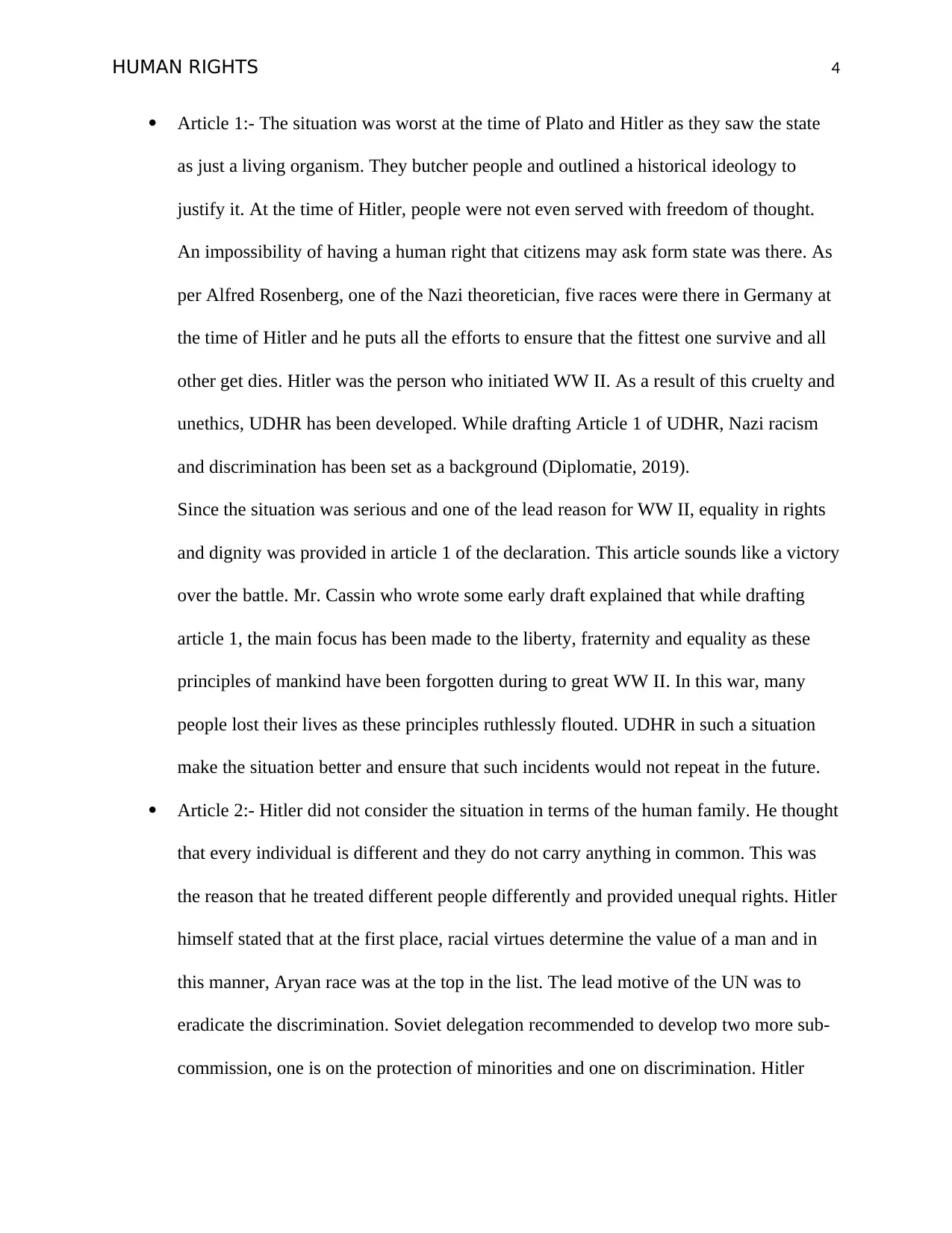
HUMAN RIGHTS 4
Article 1:- The situation was worst at the time of Plato and Hitler as they saw the state
as just a living organism. They butcher people and outlined a historical ideology to
justify it. At the time of Hitler, people were not even served with freedom of thought.
An impossibility of having a human right that citizens may ask form state was there. As
per Alfred Rosenberg, one of the Nazi theoretician, five races were there in Germany at
the time of Hitler and he puts all the efforts to ensure that the fittest one survive and all
other get dies. Hitler was the person who initiated WW II. As a result of this cruelty and
unethics, UDHR has been developed. While drafting Article 1 of UDHR, Nazi racism
and discrimination has been set as a background (Diplomatie, 2019).
Since the situation was serious and one of the lead reason for WW II, equality in rights
and dignity was provided in article 1 of the declaration. This article sounds like a victory
over the battle. Mr. Cassin who wrote some early draft explained that while drafting
article 1, the main focus has been made to the liberty, fraternity and equality as these
principles of mankind have been forgotten during to great WW II. In this war, many
people lost their lives as these principles ruthlessly flouted. UDHR in such a situation
make the situation better and ensure that such incidents would not repeat in the future.
Article 2:- Hitler did not consider the situation in terms of the human family. He thought
that every individual is different and they do not carry anything in common. This was
the reason that he treated different people differently and provided unequal rights. Hitler
himself stated that at the first place, racial virtues determine the value of a man and in
this manner, Aryan race was at the top in the list. The lead motive of the UN was to
eradicate the discrimination. Soviet delegation recommended to develop two more sub-
commission, one is on the protection of minorities and one on discrimination. Hitler
Article 1:- The situation was worst at the time of Plato and Hitler as they saw the state
as just a living organism. They butcher people and outlined a historical ideology to
justify it. At the time of Hitler, people were not even served with freedom of thought.
An impossibility of having a human right that citizens may ask form state was there. As
per Alfred Rosenberg, one of the Nazi theoretician, five races were there in Germany at
the time of Hitler and he puts all the efforts to ensure that the fittest one survive and all
other get dies. Hitler was the person who initiated WW II. As a result of this cruelty and
unethics, UDHR has been developed. While drafting Article 1 of UDHR, Nazi racism
and discrimination has been set as a background (Diplomatie, 2019).
Since the situation was serious and one of the lead reason for WW II, equality in rights
and dignity was provided in article 1 of the declaration. This article sounds like a victory
over the battle. Mr. Cassin who wrote some early draft explained that while drafting
article 1, the main focus has been made to the liberty, fraternity and equality as these
principles of mankind have been forgotten during to great WW II. In this war, many
people lost their lives as these principles ruthlessly flouted. UDHR in such a situation
make the situation better and ensure that such incidents would not repeat in the future.
Article 2:- Hitler did not consider the situation in terms of the human family. He thought
that every individual is different and they do not carry anything in common. This was
the reason that he treated different people differently and provided unequal rights. Hitler
himself stated that at the first place, racial virtues determine the value of a man and in
this manner, Aryan race was at the top in the list. The lead motive of the UN was to
eradicate the discrimination. Soviet delegation recommended to develop two more sub-
commission, one is on the protection of minorities and one on discrimination. Hitler
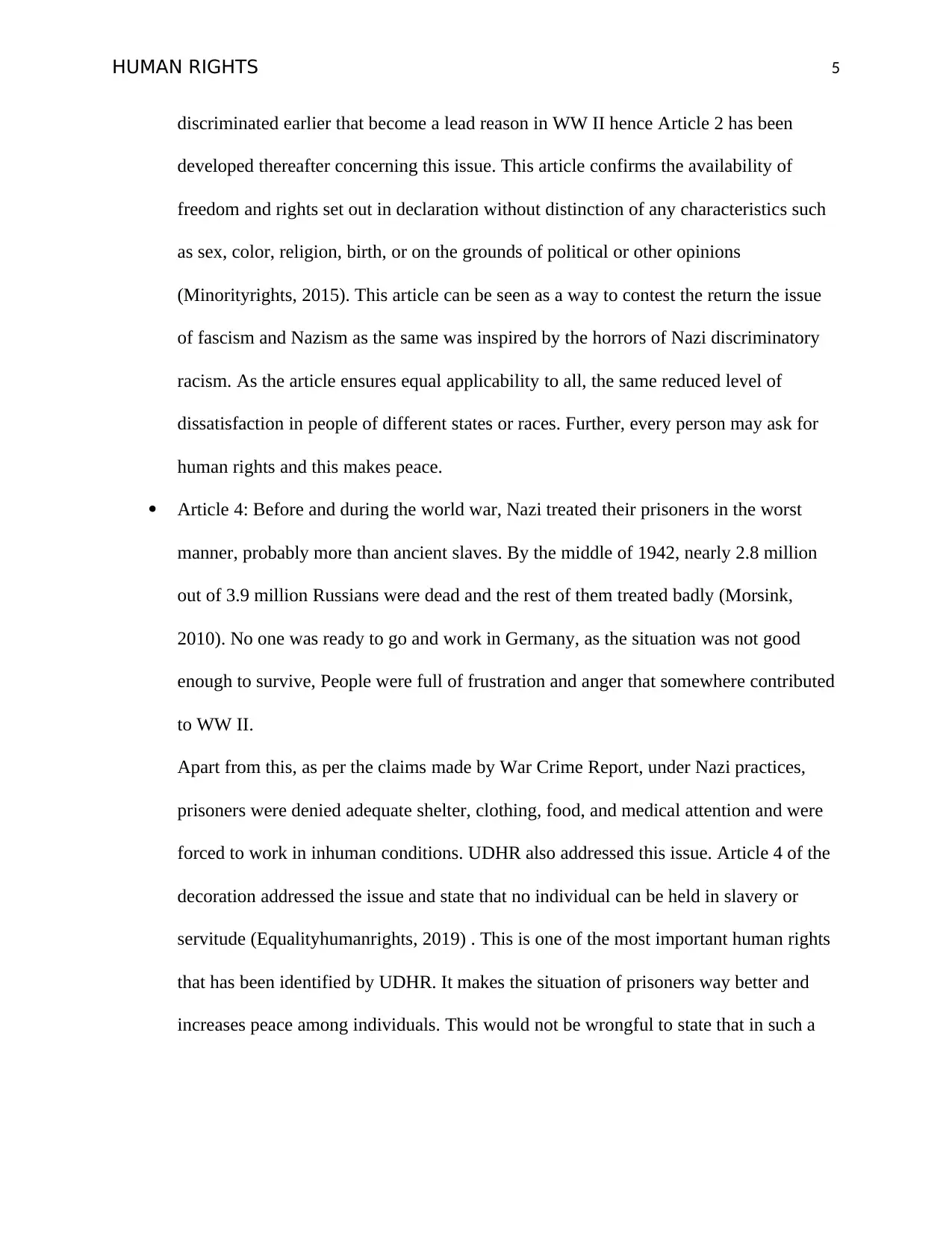
HUMAN RIGHTS 5
discriminated earlier that become a lead reason in WW II hence Article 2 has been
developed thereafter concerning this issue. This article confirms the availability of
freedom and rights set out in declaration without distinction of any characteristics such
as sex, color, religion, birth, or on the grounds of political or other opinions
(Minorityrights, 2015). This article can be seen as a way to contest the return the issue
of fascism and Nazism as the same was inspired by the horrors of Nazi discriminatory
racism. As the article ensures equal applicability to all, the same reduced level of
dissatisfaction in people of different states or races. Further, every person may ask for
human rights and this makes peace.
Article 4: Before and during the world war, Nazi treated their prisoners in the worst
manner, probably more than ancient slaves. By the middle of 1942, nearly 2.8 million
out of 3.9 million Russians were dead and the rest of them treated badly (Morsink,
2010). No one was ready to go and work in Germany, as the situation was not good
enough to survive, People were full of frustration and anger that somewhere contributed
to WW II.
Apart from this, as per the claims made by War Crime Report, under Nazi practices,
prisoners were denied adequate shelter, clothing, food, and medical attention and were
forced to work in inhuman conditions. UDHR also addressed this issue. Article 4 of the
decoration addressed the issue and state that no individual can be held in slavery or
servitude (Equalityhumanrights, 2019) . This is one of the most important human rights
that has been identified by UDHR. It makes the situation of prisoners way better and
increases peace among individuals. This would not be wrongful to state that in such a
discriminated earlier that become a lead reason in WW II hence Article 2 has been
developed thereafter concerning this issue. This article confirms the availability of
freedom and rights set out in declaration without distinction of any characteristics such
as sex, color, religion, birth, or on the grounds of political or other opinions
(Minorityrights, 2015). This article can be seen as a way to contest the return the issue
of fascism and Nazism as the same was inspired by the horrors of Nazi discriminatory
racism. As the article ensures equal applicability to all, the same reduced level of
dissatisfaction in people of different states or races. Further, every person may ask for
human rights and this makes peace.
Article 4: Before and during the world war, Nazi treated their prisoners in the worst
manner, probably more than ancient slaves. By the middle of 1942, nearly 2.8 million
out of 3.9 million Russians were dead and the rest of them treated badly (Morsink,
2010). No one was ready to go and work in Germany, as the situation was not good
enough to survive, People were full of frustration and anger that somewhere contributed
to WW II.
Apart from this, as per the claims made by War Crime Report, under Nazi practices,
prisoners were denied adequate shelter, clothing, food, and medical attention and were
forced to work in inhuman conditions. UDHR also addressed this issue. Article 4 of the
decoration addressed the issue and state that no individual can be held in slavery or
servitude (Equalityhumanrights, 2019) . This is one of the most important human rights
that has been identified by UDHR. It makes the situation of prisoners way better and
increases peace among individuals. This would not be wrongful to state that in such a
⊘ This is a preview!⊘
Do you want full access?
Subscribe today to unlock all pages.

Trusted by 1+ million students worldwide
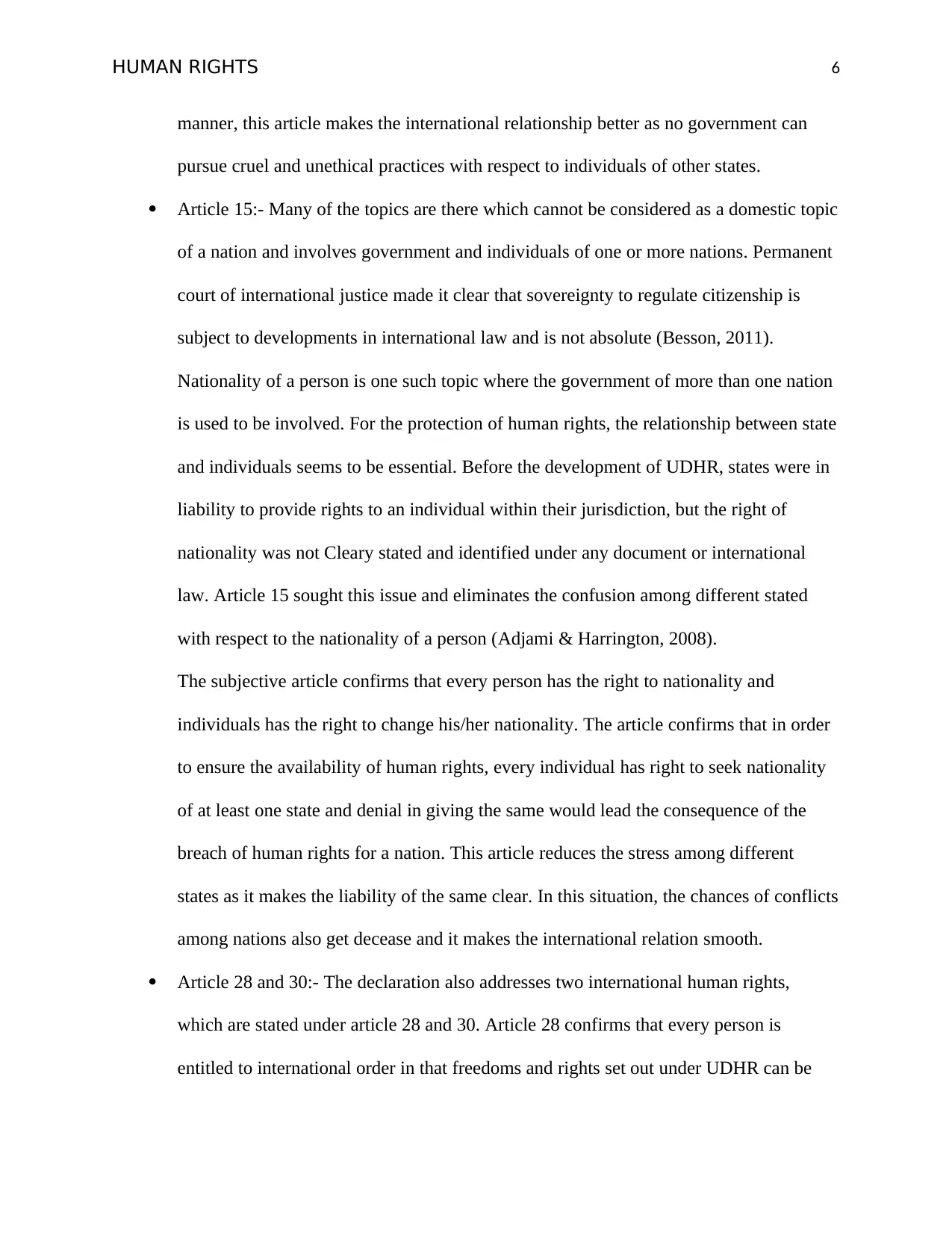
HUMAN RIGHTS 6
manner, this article makes the international relationship better as no government can
pursue cruel and unethical practices with respect to individuals of other states.
Article 15:- Many of the topics are there which cannot be considered as a domestic topic
of a nation and involves government and individuals of one or more nations. Permanent
court of international justice made it clear that sovereignty to regulate citizenship is
subject to developments in international law and is not absolute (Besson, 2011).
Nationality of a person is one such topic where the government of more than one nation
is used to be involved. For the protection of human rights, the relationship between state
and individuals seems to be essential. Before the development of UDHR, states were in
liability to provide rights to an individual within their jurisdiction, but the right of
nationality was not Cleary stated and identified under any document or international
law. Article 15 sought this issue and eliminates the confusion among different stated
with respect to the nationality of a person (Adjami & Harrington, 2008).
The subjective article confirms that every person has the right to nationality and
individuals has the right to change his/her nationality. The article confirms that in order
to ensure the availability of human rights, every individual has right to seek nationality
of at least one state and denial in giving the same would lead the consequence of the
breach of human rights for a nation. This article reduces the stress among different
states as it makes the liability of the same clear. In this situation, the chances of conflicts
among nations also get decease and it makes the international relation smooth.
Article 28 and 30:- The declaration also addresses two international human rights,
which are stated under article 28 and 30. Article 28 confirms that every person is
entitled to international order in that freedoms and rights set out under UDHR can be
manner, this article makes the international relationship better as no government can
pursue cruel and unethical practices with respect to individuals of other states.
Article 15:- Many of the topics are there which cannot be considered as a domestic topic
of a nation and involves government and individuals of one or more nations. Permanent
court of international justice made it clear that sovereignty to regulate citizenship is
subject to developments in international law and is not absolute (Besson, 2011).
Nationality of a person is one such topic where the government of more than one nation
is used to be involved. For the protection of human rights, the relationship between state
and individuals seems to be essential. Before the development of UDHR, states were in
liability to provide rights to an individual within their jurisdiction, but the right of
nationality was not Cleary stated and identified under any document or international
law. Article 15 sought this issue and eliminates the confusion among different stated
with respect to the nationality of a person (Adjami & Harrington, 2008).
The subjective article confirms that every person has the right to nationality and
individuals has the right to change his/her nationality. The article confirms that in order
to ensure the availability of human rights, every individual has right to seek nationality
of at least one state and denial in giving the same would lead the consequence of the
breach of human rights for a nation. This article reduces the stress among different
states as it makes the liability of the same clear. In this situation, the chances of conflicts
among nations also get decease and it makes the international relation smooth.
Article 28 and 30:- The declaration also addresses two international human rights,
which are stated under article 28 and 30. Article 28 confirms that every person is
entitled to international order in that freedoms and rights set out under UDHR can be
Paraphrase This Document
Need a fresh take? Get an instant paraphrase of this document with our AI Paraphraser
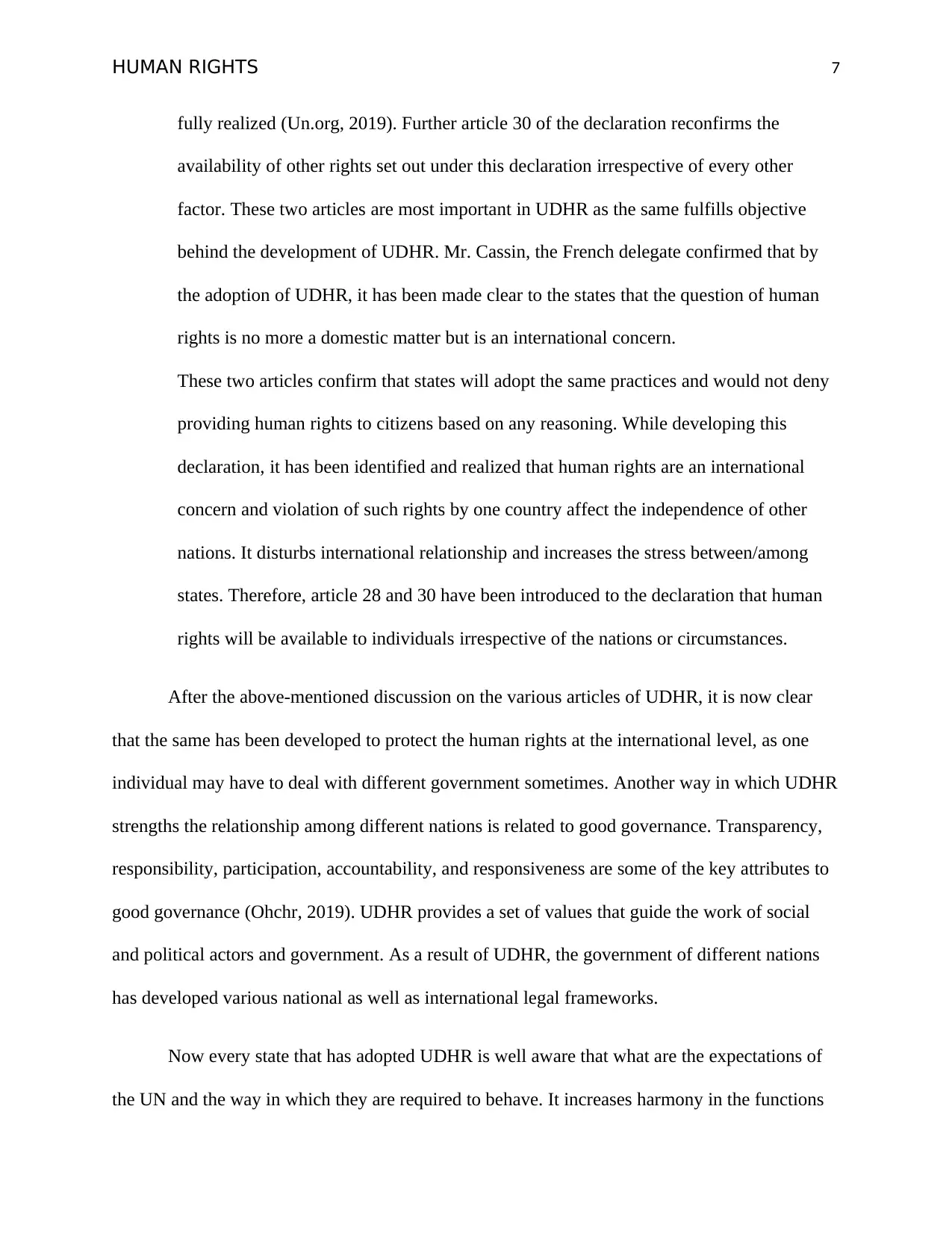
HUMAN RIGHTS 7
fully realized (Un.org, 2019). Further article 30 of the declaration reconfirms the
availability of other rights set out under this declaration irrespective of every other
factor. These two articles are most important in UDHR as the same fulfills objective
behind the development of UDHR. Mr. Cassin, the French delegate confirmed that by
the adoption of UDHR, it has been made clear to the states that the question of human
rights is no more a domestic matter but is an international concern.
These two articles confirm that states will adopt the same practices and would not deny
providing human rights to citizens based on any reasoning. While developing this
declaration, it has been identified and realized that human rights are an international
concern and violation of such rights by one country affect the independence of other
nations. It disturbs international relationship and increases the stress between/among
states. Therefore, article 28 and 30 have been introduced to the declaration that human
rights will be available to individuals irrespective of the nations or circumstances.
After the above-mentioned discussion on the various articles of UDHR, it is now clear
that the same has been developed to protect the human rights at the international level, as one
individual may have to deal with different government sometimes. Another way in which UDHR
strengths the relationship among different nations is related to good governance. Transparency,
responsibility, participation, accountability, and responsiveness are some of the key attributes to
good governance (Ohchr, 2019). UDHR provides a set of values that guide the work of social
and political actors and government. As a result of UDHR, the government of different nations
has developed various national as well as international legal frameworks.
Now every state that has adopted UDHR is well aware that what are the expectations of
the UN and the way in which they are required to behave. It increases harmony in the functions
fully realized (Un.org, 2019). Further article 30 of the declaration reconfirms the
availability of other rights set out under this declaration irrespective of every other
factor. These two articles are most important in UDHR as the same fulfills objective
behind the development of UDHR. Mr. Cassin, the French delegate confirmed that by
the adoption of UDHR, it has been made clear to the states that the question of human
rights is no more a domestic matter but is an international concern.
These two articles confirm that states will adopt the same practices and would not deny
providing human rights to citizens based on any reasoning. While developing this
declaration, it has been identified and realized that human rights are an international
concern and violation of such rights by one country affect the independence of other
nations. It disturbs international relationship and increases the stress between/among
states. Therefore, article 28 and 30 have been introduced to the declaration that human
rights will be available to individuals irrespective of the nations or circumstances.
After the above-mentioned discussion on the various articles of UDHR, it is now clear
that the same has been developed to protect the human rights at the international level, as one
individual may have to deal with different government sometimes. Another way in which UDHR
strengths the relationship among different nations is related to good governance. Transparency,
responsibility, participation, accountability, and responsiveness are some of the key attributes to
good governance (Ohchr, 2019). UDHR provides a set of values that guide the work of social
and political actors and government. As a result of UDHR, the government of different nations
has developed various national as well as international legal frameworks.
Now every state that has adopted UDHR is well aware that what are the expectations of
the UN and the way in which they are required to behave. It increases harmony in the functions
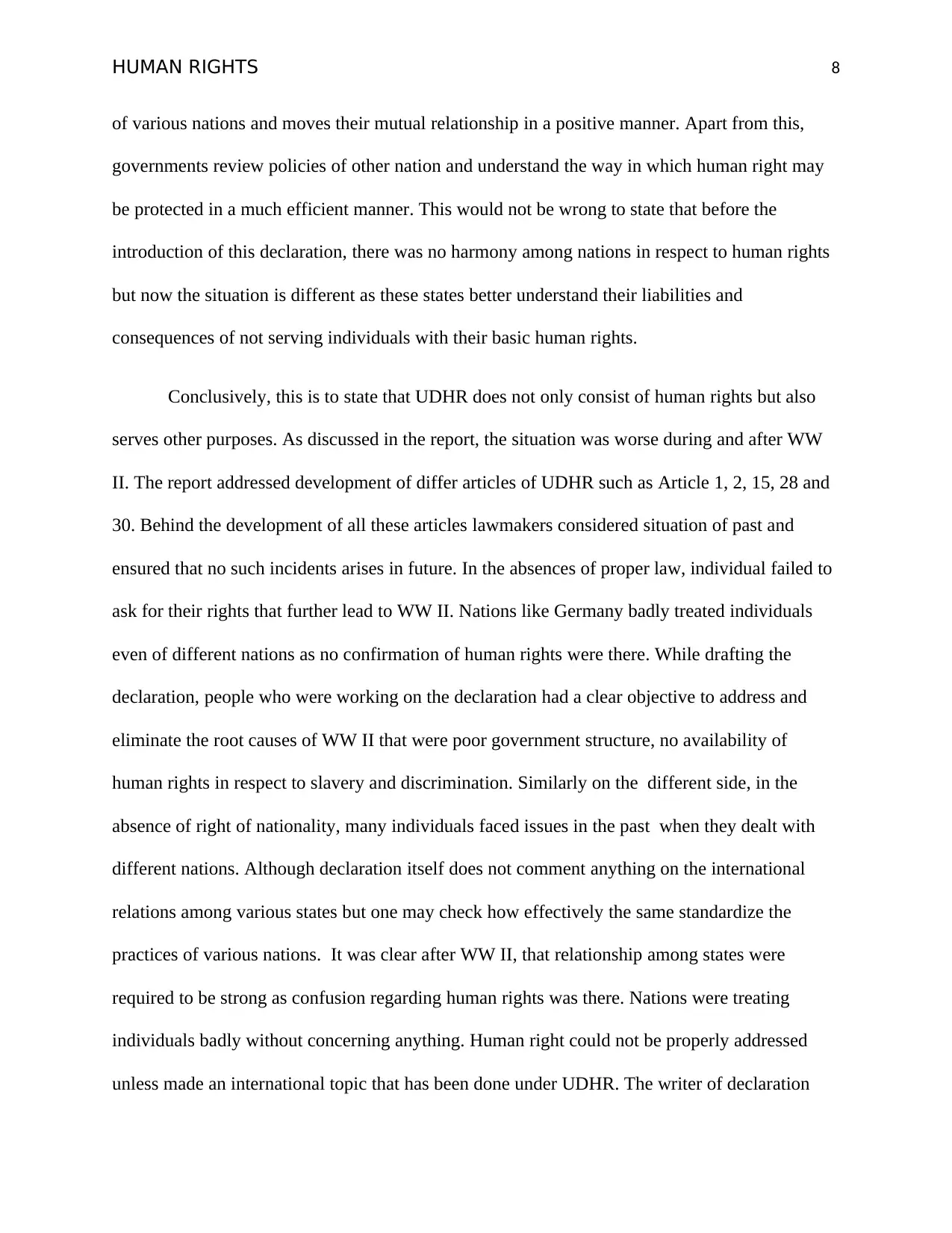
HUMAN RIGHTS 8
of various nations and moves their mutual relationship in a positive manner. Apart from this,
governments review policies of other nation and understand the way in which human right may
be protected in a much efficient manner. This would not be wrong to state that before the
introduction of this declaration, there was no harmony among nations in respect to human rights
but now the situation is different as these states better understand their liabilities and
consequences of not serving individuals with their basic human rights.
Conclusively, this is to state that UDHR does not only consist of human rights but also
serves other purposes. As discussed in the report, the situation was worse during and after WW
II. The report addressed development of differ articles of UDHR such as Article 1, 2, 15, 28 and
30. Behind the development of all these articles lawmakers considered situation of past and
ensured that no such incidents arises in future. In the absences of proper law, individual failed to
ask for their rights that further lead to WW II. Nations like Germany badly treated individuals
even of different nations as no confirmation of human rights were there. While drafting the
declaration, people who were working on the declaration had a clear objective to address and
eliminate the root causes of WW II that were poor government structure, no availability of
human rights in respect to slavery and discrimination. Similarly on the different side, in the
absence of right of nationality, many individuals faced issues in the past when they dealt with
different nations. Although declaration itself does not comment anything on the international
relations among various states but one may check how effectively the same standardize the
practices of various nations. It was clear after WW II, that relationship among states were
required to be strong as confusion regarding human rights was there. Nations were treating
individuals badly without concerning anything. Human right could not be properly addressed
unless made an international topic that has been done under UDHR. The writer of declaration
of various nations and moves their mutual relationship in a positive manner. Apart from this,
governments review policies of other nation and understand the way in which human right may
be protected in a much efficient manner. This would not be wrong to state that before the
introduction of this declaration, there was no harmony among nations in respect to human rights
but now the situation is different as these states better understand their liabilities and
consequences of not serving individuals with their basic human rights.
Conclusively, this is to state that UDHR does not only consist of human rights but also
serves other purposes. As discussed in the report, the situation was worse during and after WW
II. The report addressed development of differ articles of UDHR such as Article 1, 2, 15, 28 and
30. Behind the development of all these articles lawmakers considered situation of past and
ensured that no such incidents arises in future. In the absences of proper law, individual failed to
ask for their rights that further lead to WW II. Nations like Germany badly treated individuals
even of different nations as no confirmation of human rights were there. While drafting the
declaration, people who were working on the declaration had a clear objective to address and
eliminate the root causes of WW II that were poor government structure, no availability of
human rights in respect to slavery and discrimination. Similarly on the different side, in the
absence of right of nationality, many individuals faced issues in the past when they dealt with
different nations. Although declaration itself does not comment anything on the international
relations among various states but one may check how effectively the same standardize the
practices of various nations. It was clear after WW II, that relationship among states were
required to be strong as confusion regarding human rights was there. Nations were treating
individuals badly without concerning anything. Human right could not be properly addressed
unless made an international topic that has been done under UDHR. The writer of declaration
⊘ This is a preview!⊘
Do you want full access?
Subscribe today to unlock all pages.

Trusted by 1+ million students worldwide
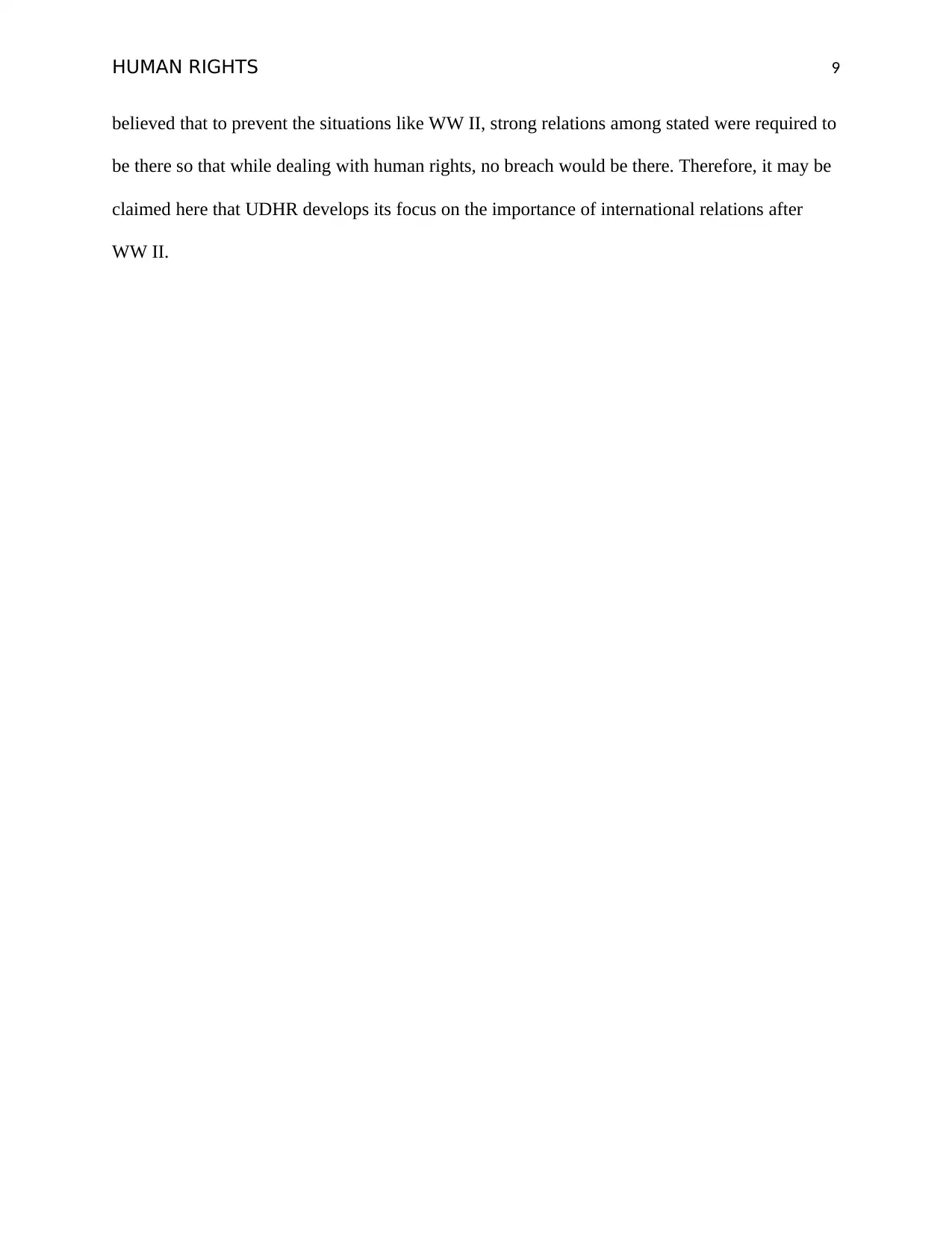
HUMAN RIGHTS 9
believed that to prevent the situations like WW II, strong relations among stated were required to
be there so that while dealing with human rights, no breach would be there. Therefore, it may be
claimed here that UDHR develops its focus on the importance of international relations after
WW II.
believed that to prevent the situations like WW II, strong relations among stated were required to
be there so that while dealing with human rights, no breach would be there. Therefore, it may be
claimed here that UDHR develops its focus on the importance of international relations after
WW II.
Paraphrase This Document
Need a fresh take? Get an instant paraphrase of this document with our AI Paraphraser
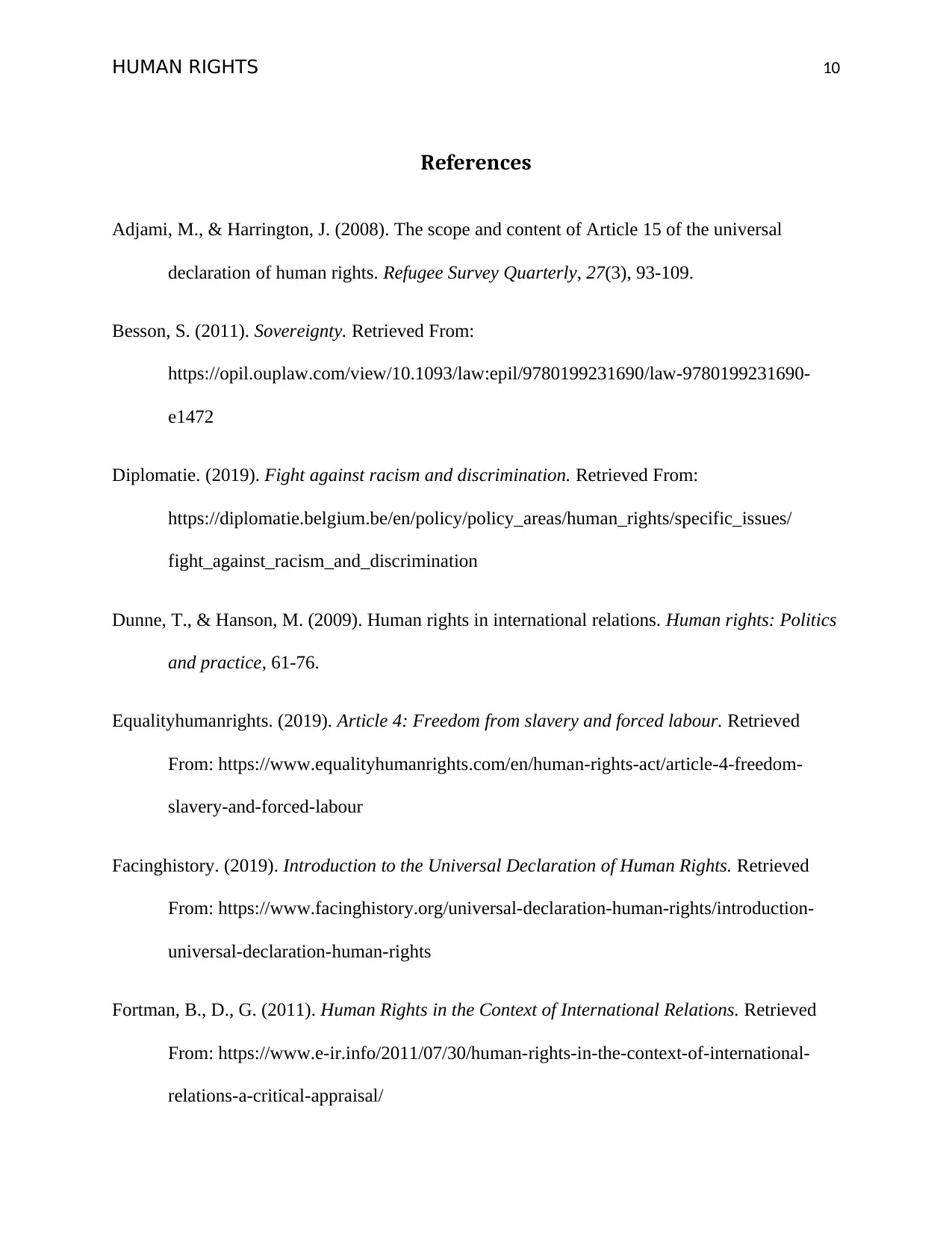
HUMAN RIGHTS 10
References
Adjami, M., & Harrington, J. (2008). The scope and content of Article 15 of the universal
declaration of human rights. Refugee Survey Quarterly, 27(3), 93-109.
Besson, S. (2011). Sovereignty. Retrieved From:
https://opil.ouplaw.com/view/10.1093/law:epil/9780199231690/law-9780199231690-
e1472
Diplomatie. (2019). Fight against racism and discrimination. Retrieved From:
https://diplomatie.belgium.be/en/policy/policy_areas/human_rights/specific_issues/
fight_against_racism_and_discrimination
Dunne, T., & Hanson, M. (2009). Human rights in international relations. Human rights: Politics
and practice, 61-76.
Equalityhumanrights. (2019). Article 4: Freedom from slavery and forced labour. Retrieved
From: https://www.equalityhumanrights.com/en/human-rights-act/article-4-freedom-
slavery-and-forced-labour
Facinghistory. (2019). Introduction to the Universal Declaration of Human Rights. Retrieved
From: https://www.facinghistory.org/universal-declaration-human-rights/introduction-
universal-declaration-human-rights
Fortman, B., D., G. (2011). Human Rights in the Context of International Relations. Retrieved
From: https://www.e-ir.info/2011/07/30/human-rights-in-the-context-of-international-
relations-a-critical-appraisal/
References
Adjami, M., & Harrington, J. (2008). The scope and content of Article 15 of the universal
declaration of human rights. Refugee Survey Quarterly, 27(3), 93-109.
Besson, S. (2011). Sovereignty. Retrieved From:
https://opil.ouplaw.com/view/10.1093/law:epil/9780199231690/law-9780199231690-
e1472
Diplomatie. (2019). Fight against racism and discrimination. Retrieved From:
https://diplomatie.belgium.be/en/policy/policy_areas/human_rights/specific_issues/
fight_against_racism_and_discrimination
Dunne, T., & Hanson, M. (2009). Human rights in international relations. Human rights: Politics
and practice, 61-76.
Equalityhumanrights. (2019). Article 4: Freedom from slavery and forced labour. Retrieved
From: https://www.equalityhumanrights.com/en/human-rights-act/article-4-freedom-
slavery-and-forced-labour
Facinghistory. (2019). Introduction to the Universal Declaration of Human Rights. Retrieved
From: https://www.facinghistory.org/universal-declaration-human-rights/introduction-
universal-declaration-human-rights
Fortman, B., D., G. (2011). Human Rights in the Context of International Relations. Retrieved
From: https://www.e-ir.info/2011/07/30/human-rights-in-the-context-of-international-
relations-a-critical-appraisal/
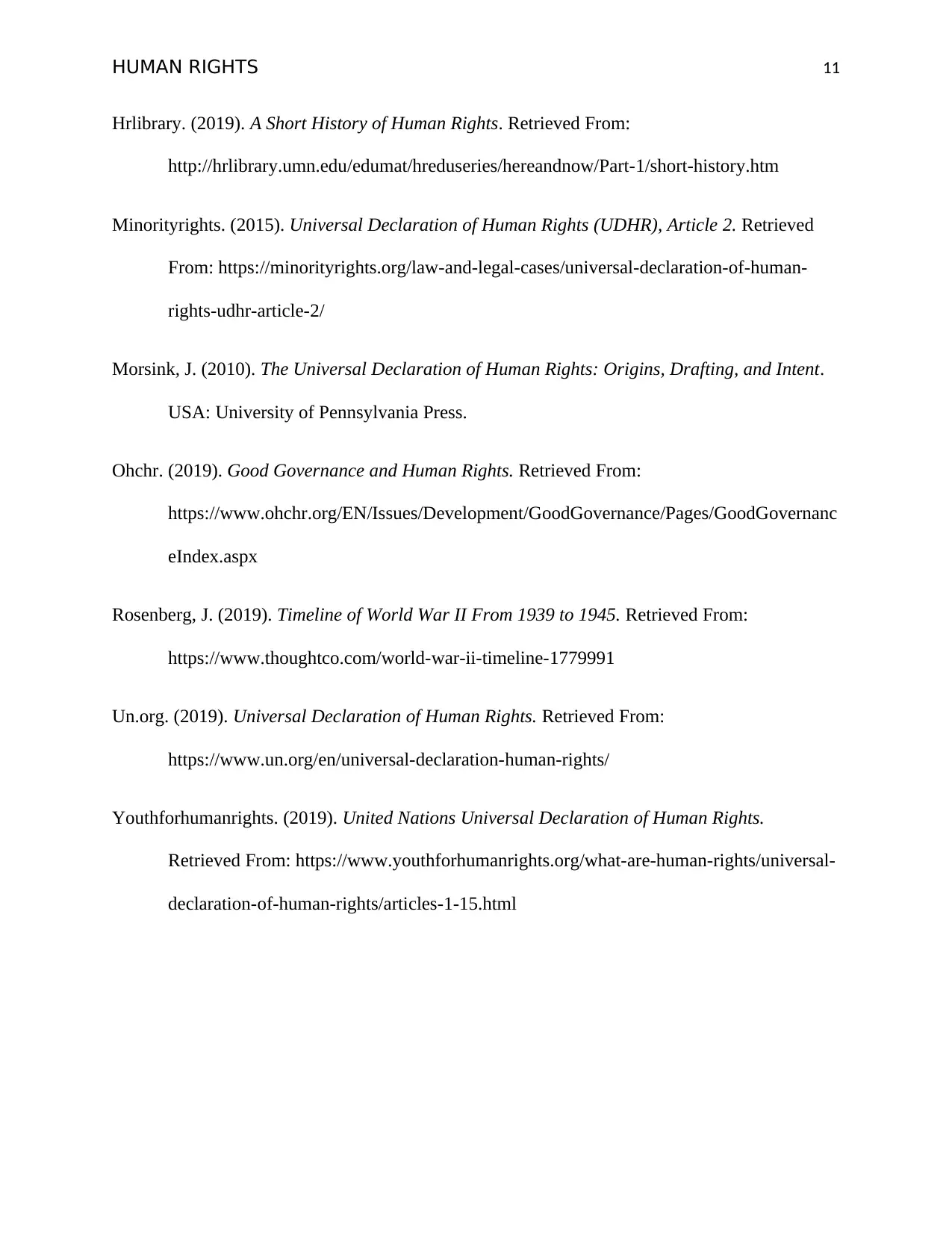
HUMAN RIGHTS 11
Hrlibrary. (2019). A Short History of Human Rights. Retrieved From:
http://hrlibrary.umn.edu/edumat/hreduseries/hereandnow/Part-1/short-history.htm
Minorityrights. (2015). Universal Declaration of Human Rights (UDHR), Article 2. Retrieved
From: https://minorityrights.org/law-and-legal-cases/universal-declaration-of-human-
rights-udhr-article-2/
Morsink, J. (2010). The Universal Declaration of Human Rights: Origins, Drafting, and Intent.
USA: University of Pennsylvania Press.
Ohchr. (2019). Good Governance and Human Rights. Retrieved From:
https://www.ohchr.org/EN/Issues/Development/GoodGovernance/Pages/GoodGovernanc
eIndex.aspx
Rosenberg, J. (2019). Timeline of World War II From 1939 to 1945. Retrieved From:
https://www.thoughtco.com/world-war-ii-timeline-1779991
Un.org. (2019). Universal Declaration of Human Rights. Retrieved From:
https://www.un.org/en/universal-declaration-human-rights/
Youthforhumanrights. (2019). United Nations Universal Declaration of Human Rights.
Retrieved From: https://www.youthforhumanrights.org/what-are-human-rights/universal-
declaration-of-human-rights/articles-1-15.html
Hrlibrary. (2019). A Short History of Human Rights. Retrieved From:
http://hrlibrary.umn.edu/edumat/hreduseries/hereandnow/Part-1/short-history.htm
Minorityrights. (2015). Universal Declaration of Human Rights (UDHR), Article 2. Retrieved
From: https://minorityrights.org/law-and-legal-cases/universal-declaration-of-human-
rights-udhr-article-2/
Morsink, J. (2010). The Universal Declaration of Human Rights: Origins, Drafting, and Intent.
USA: University of Pennsylvania Press.
Ohchr. (2019). Good Governance and Human Rights. Retrieved From:
https://www.ohchr.org/EN/Issues/Development/GoodGovernance/Pages/GoodGovernanc
eIndex.aspx
Rosenberg, J. (2019). Timeline of World War II From 1939 to 1945. Retrieved From:
https://www.thoughtco.com/world-war-ii-timeline-1779991
Un.org. (2019). Universal Declaration of Human Rights. Retrieved From:
https://www.un.org/en/universal-declaration-human-rights/
Youthforhumanrights. (2019). United Nations Universal Declaration of Human Rights.
Retrieved From: https://www.youthforhumanrights.org/what-are-human-rights/universal-
declaration-of-human-rights/articles-1-15.html
⊘ This is a preview!⊘
Do you want full access?
Subscribe today to unlock all pages.

Trusted by 1+ million students worldwide
1 out of 12
Related Documents
Your All-in-One AI-Powered Toolkit for Academic Success.
+13062052269
info@desklib.com
Available 24*7 on WhatsApp / Email
![[object Object]](/_next/static/media/star-bottom.7253800d.svg)
Unlock your academic potential
Copyright © 2020–2026 A2Z Services. All Rights Reserved. Developed and managed by ZUCOL.





